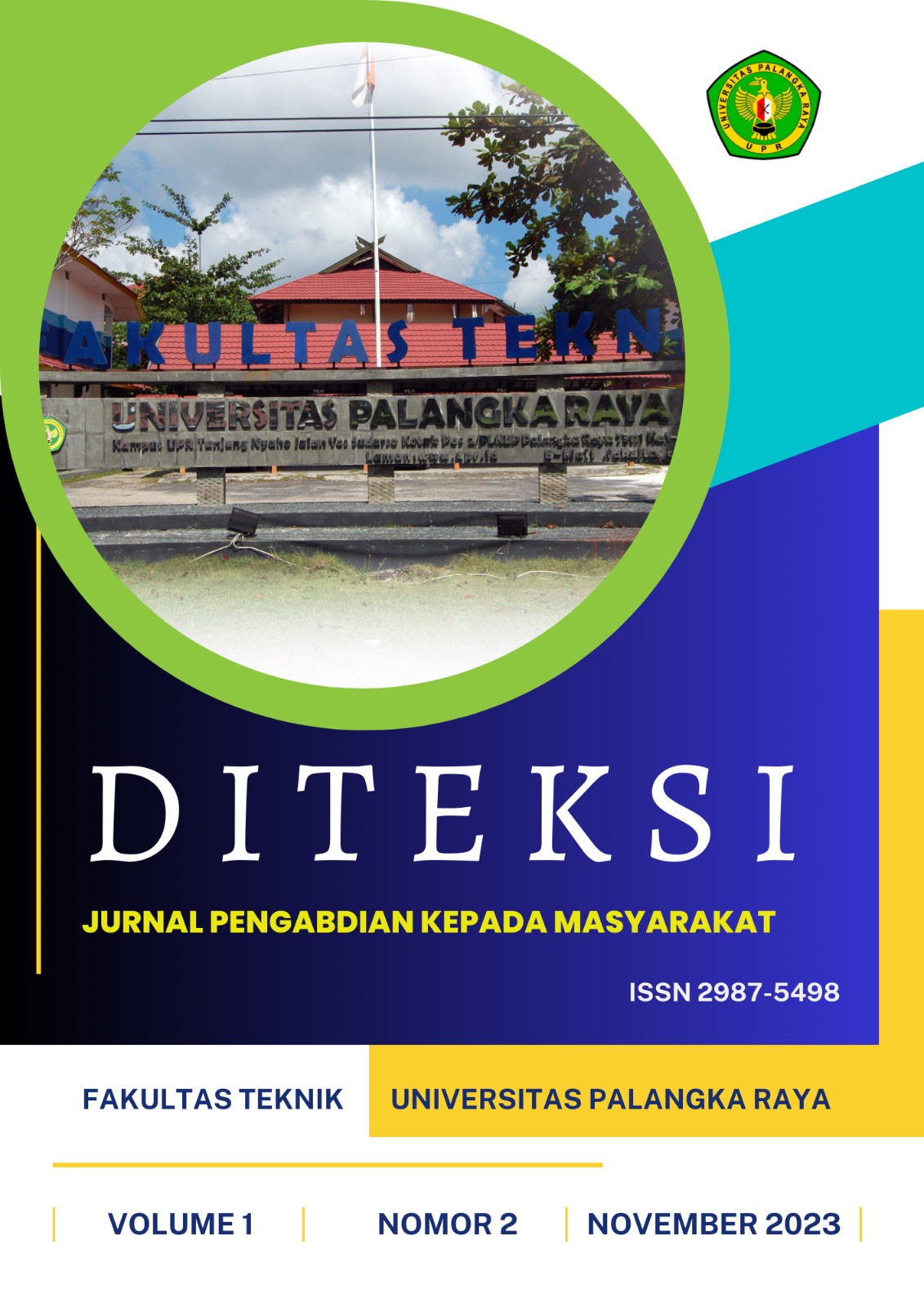Pengolahan Limbah Organik Rumah Tangga Menjadi Kompos Melalui Penerapan Metode Takakura
DOI:
https://doi.org/10.36873/diteksi.v1i2.11515Keywords:
Compost, organic waste, Takakura MethodAbstract
Waste-related problems are serious problems that are being faced by the Samarinda City government. Waste production in Samarinda City reaches 500 tonnes/day. The programmes presented by the Department of Environment (DLH) of Samarinda City currently focus on inorganic waste management. In fact, half (50%) of the total waste production in Samarinda City comes from organic waste, especially those generated from household activities. This community service programme aims to provide education to the community, especially the Family Welfare Empowerment (PKK) group on how to process household organic waste so as to produce compost that can be used by the community. The method used in this composting is the Takakura method. The dedication programme for the use of household waste into compost is important to do in order to reduce household waste in the environment and change the perspective regarding waste that has no economic value. This service program has produced products in the form of compost that is dark in colour (blackish-black), fine textured and compost temperatures ranging from 300C-350C. Based on questionnaires and interviews, 75% of participants understood the material presented, 90% had a high level of satisfaction with the programme and 50% of participants stated that they were willing to apply the composting method.
Downloads
References
Referensi
Embuiru, Herman. 2002. Katekismus Gereja Katolik. Arnoldus Ende: Ende. 1998.
Kartosiswoyo, Kitab Hukum Kanonik (Codex Iuris Canonica). Yogyakarta: Konferensi Wali Gereja Indonesia.
Kayan, Wilfridus Samon. 2002. Nilai Cinta Kasih Kesetiaan Perkawinan Katolik Di Stasi Mewet Dalam Seruan Apostolik Amoris Laetitia. Jurnal Agama, Pendidikan Dan Budaya. Vol. 3. No. 1.
Kusumawanta, Dominikus Gusti Bagus. 2007. “Bonum Coniugum” Dalam Perkawinan Katolik. Yogyakarta: Pustaka Nusantara.
Lantok, Noberta Yati. 2018. Tribunal Perkawinan Gerejawi. Pontianak: Perc. Eggra.
Lon, Yohanes Servatius. 2019. Hukum Perkawinan Sakramental Dalam Gereja Katolik. Yogyakarta: Kanisius.
Moa, Antonius. 2022. Cinta Kasih Suami-Istri Sebagai Fondasi Kehidupan Keluarga Kristiani. Jurnal Filsafat-Teologi. Vol.19. No. 2.
Nomo, Thierry Juvinus. 2014. Pelaksana Perkawinan Menurut Hukum Kanonik di Kevikepan Tonesea Sebagai Syarat Sahnya Perkawinan Dalam Perspektif UU No. 1 Tahun 1974 Di Indonesia. Jurnal Lex Et Societatis. Vol. 2. No. 4.
Pabubung, Michael Reskianto. 2022. Perkawinan Katolik Dan Tradisi Rampanan Kapa Di Toraja Dalam Analisis Komparatif. Jurnal Ilmiah Pastoral, Kateketik dan Pendidikan Agama Katolik. Vol 1. No.1.
Pareira, Berhold Anton. 2015. Homili Dan Pembangunan Gereja Masa Depan (Evangelii Gaudium, art. 135-159). Raymundus Sudhiarsa, Menjadi Gereja Indonesia yang Gembira dan Berbelaskasih Dulu, Kini dan Esok. Malang: Sekolah Tinggi Filsafat Teologi Widya Sasana.
Purba, Asrot. 2023. Manfaat Katekese Persiapan Perkawinan Bagi Keluarga Muda Dalam Membangun Keluarga Rukun Kristini. Jurnal Filsafat Teologi. Vol. 20. No. 2.
Saeng,Valentinus. 2020. Konsep Persahabatan Dalam Pemikiran Thomas Aquinas. F.X. Kurniawan (ed.el.,), Kamu Adalah Sahabatku. Malang: Sekolah Tinggi Filsafat Teologi Widya Sasana.
Rubiyantmoko, Robertus. 2011. Perkawinan Katolik Menurut Kitab Hukum Kanonik. Yogyakarta: Kanisius,
Tamelab, Petrus. 2022. Peran Gereja Dalam mendamping Keluarga Pasca Menikah di Paroki Santo Fransiskus Xaverius Wolotopo Keuskupan Agung Ende. Open Journal Sistems. Vol.3. No.2.
Wejasokani, Daniel. 2020. Hukum Perkawinan Katolik Dan Sifatnya: Sebuah Manifestasi Relasi Cinta Kristus Kepada Gereja Yang Satu Dan Tak Terpisahkan. Jurnal Hukum Magnum Opus. Vol. 3. No. 1.
Wijanarko, Robertus. 2015. Memahami Medan Pelayanan Gereja Indonesia Dewasa Ini (Tantangan Menghadirkan Gereja dan Berbelaskasih). Raymundus Sudhiarsa, Menjadi Gereja Indonesia yang Berbelas Kasih dan Berbelaskasih. Malang: Seri Filsafat Teologi Widya Sasana.
Downloads
Published
Versions
- 2023-11-30 (1)
- 2023-11-30 (1)








